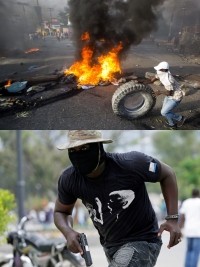|
||||||||||||||||||
| Download the revised decree and electoral calendar, published in the official journal |
|
|
Haiti - UN : BINUH report, violence and gangs in Haiti 04/10/2020 11:10:03
As part of Security Council resolution 2476 (2019), by which the United Nations Integrated Office in Haiti (BINUH) was created, the Office must produce a report to the UN Secretary General every 120 days, on the situation in Haiti and on the implementation of the Office's mandate, as the UN Mission is completing its first year of existence. Extract from the report (end of Sep 2020) : "[...] The report at the level of community violence reduction indicates that linkages between gang violence and political developments continued to influence the levels of insecurity observed in Haiti. This was evident in recent months in the Port-au-Prince metropolitan area (West Department), where deadly inter-gang clashes in Cité Soleil and Bel Air over control of populous areas that house major public markets and large polling stations displaced at least 298 households and fuelled a widespread sentiment of insecurity. These dynamics, which suggest that competition among gangs is growing in anticipation of elections, led to changes in the constellation of gangs in the metropolitan area, with the formation on 10 June of a new alliance, the G9 an fanmi (G9), initially comprising nine gangs from Cité Soleil, La Saline and lower Delmas, but which has since expanded to 15 gangs spanning several neighbourhoods. The G9, which was reportedly formed at the instigation of former police officer Jimmy “Barbecue” Cherizier – who is suspected of being implicated in the emblematic cases of Grand Ravine (2017), La Saline (2018) and Bel-Air (2019) – is notorious because of the diversity of its membership, its influence over vast swaths of territory in the Port-au-Prince metropolitan area and its narrative as a social movement fighting for better services and opportunities in poor neighbourhoods. Its creation raised concerns among political and civil society actors about the detrimental impact partisan gangs can have on State institutions. The signing on 22 August by several gang leaders within G9 of a truce with rivals in Cité Soleil and reports in late August of tensions within the alliance gave rise to questions about its ability to maintain cohesion. Nonetheless, the consolidation of the G9 control of parts of the metropolitan zone appears to have affected major crime trends during the reporting period. Intentional homicides reported to the police decreased by 12 per cent between 1 June and 31 August, with 328 victims (including 24 women and 9 children) compared with 373 (including 9 women and 12 children) in the preceding three months. Just as in previous periods, 74 per cent of those cases were recorded in the West Department, where some 35 per cent of the population lives and gang violence is more prevalent. A closer look at statistics, however, reveals a sudden spike in June (171 reported intentional homicides, compared with 132 in May) that coincided with the formation of the G9 alliance and corresponds with the deadliest raids on the Port-au-Prince neighbourhood of Pont-Rouge and the commune of Cité Soleil. This was followed by a steep decline after July (with 77 homicides reported), once alliances were reconfigured. Conversely, abductions followed the opposite trend. After steadily declining since March to a monthly average of 3.5, abduction cases increased to 19 in July, as gangs reverted to lucrative activities following weeks of intense negotiations and clashes. In total, 32 individuals (including 9 women and 3 children) were abducted, compared with 25 victims (including 7 women and 7 children) in the three preceding months, a 28 per cent increase. This uptick in kidnappings appears, however, to have been contained by police operations conducted in the latter part of the reporting period, which led to the arrest of 53 abduction suspects and 51 additional gang members. A noticeable increase in gang-related incidents was also observed in other parts of the country, particularly in Cap-Haïtien (North Department) and Petite-Rivière-de-l’Artibonite (Artibonite Department), where insecurity limits movement on several important thoroughfares. Just as in the capital, gang violence might increase once an electoral calendar is announced. Curbing the expansion of gangs thus remains a priority for the Haitian National Police, which launched another nationwide police operation on 7 August, and increased its presence in sensitive areas with the construction of new police stations in Anse-à-Veau (Nippes Department), Ganthier and Malpasse (West Department). The National Commission for Disarmament, Demobilization and Reintegration continued to consolidate its position as the leading national institution on community violence reduction, despite persistent operational constraints. Sexual and gender-based violence remained prevalent and continued to be underreported. The national health system reported 457 cases of rape (including that of 164 women, 235 children and 58 men) between 1 June and 31 August, compared with 541 between 1 March and 31 May. By comparison, 43 rapes were reported to the Haitian National Police between 1 June and 31 August, compared with 35 during the earlier period. While legal protections for women have improved in the updated Penal Code, with anti-discrimination provisions and the decriminalization of abortion, a comprehensive law on violence against women has yet to be adopted, and redress for victims remains inadequate. " Téléchargez le rapport complet du BINUH (PDF in English) : https://www.haitilibre.com/docs/S_2020_944_E.pdf HL/ HaitiLibre
|
|
|
Why HaitiLibre ? |
Contact us |
Français
Copyright © 2010 - 2026 Haitilibre.com |





